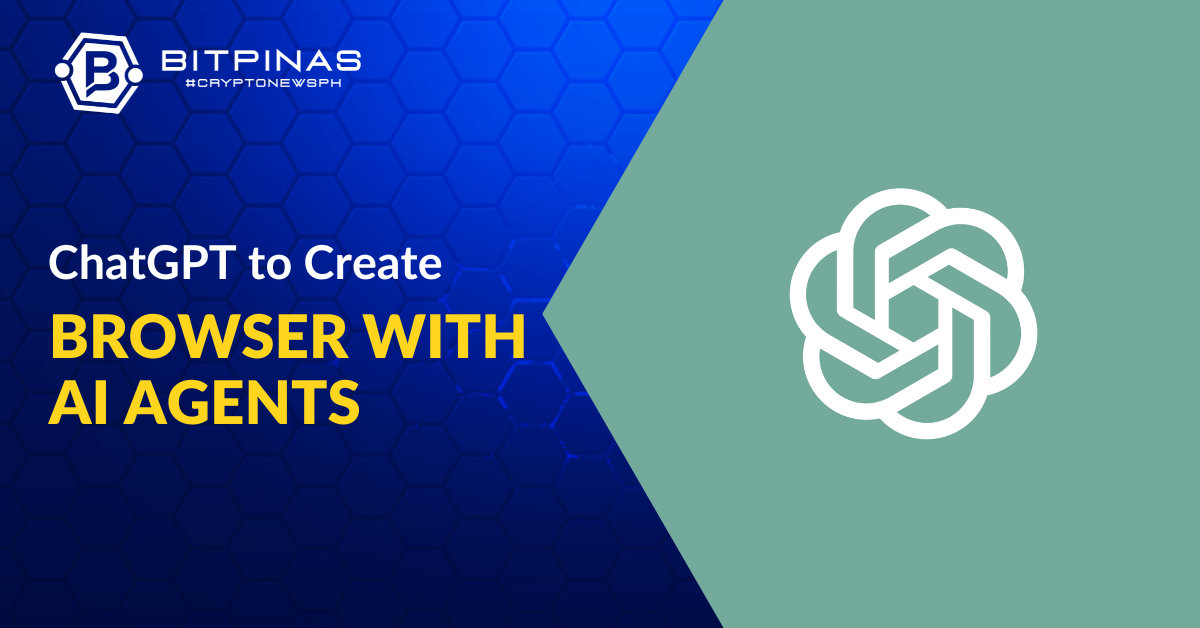Disclaimer: This article is for informational purposes only and does not constitute financial advice. BitPinas has no commercial relationship with any mentioned entity unless otherwise stated.
📬 Get the biggest crypto stories in the Philippines and Southeast Asia every week — subscribe to the BitPinas Newsletter.
OpenAI, an artificial intelligence (AI) firm known for its flagship product ChatGPT, is reportedly gearing up to introduce a web browser to compete with Alphabet’s Google Chrome, according to three sources familiar with the matter.
Upcoming OpenAI Browser
In an exclusive report from Reuters, it was revealed that the upcoming browser will feature a native chat interface and allow for the integration of AI agents, enabling tasks such as booking reservations or filling out online forms on behalf of users.
Built on Google’s open-source Chromium code, the browser is part of OpenAI’s broader strategy to expand its AI services into users’ daily lives, both personal and professional.
As per the report, unlike traditional browsers, OpenAI’s product is designed to retain some user interactions within a ChatGPT-style interface rather than directing users to external websites. This functionality, coupled with AI agent integration, positions the browser as a platform that can perform autonomous tasks during the browsing experience.
Moreover, OpenAI’s browser effort is said to be led by a team that includes two former Google vice presidents involved in Chrome’s original development. While the company previously considered acquiring Chrome, an option mentioned in antitrust hearings, it opted instead to build its own browser to maintain control over data collection.
As per Reuters, OpenAI declined to comment on the browser’s launch.
What Could Happen?
If widely adopted, particularly among the 500 million weekly active users of ChatGPT, OpenAI’s browser could disrupt a key component of Google’s advertising business; other traditional browsers could also face a wave of disruption, according to Reuters correspondents.
Chrome, which currently holds more than two-thirds of the global browser market, could also see some ChatGPT users shift to OpenAI’s AI-powered browser, a change that might impact Google’s advertising revenue.
Since Chrome is not just a browser but also a vital tool for data collection that feeds Google’s search and advertising businesses, any shift in user behavior could directly impact Google’s ad revenue and search dominance.
AI Integration with Browsers
Here is the list of currently available browsers and their integrated AI tools for users.
Google Chrome (Gemini)
Google Chrome has begun integrating its in-house AI model, Gemini, which was formerly Bard, into both the browser and Google’s search infrastructure. Chrome’s AI capabilities include:
- Smart tab management that groups similar pages and suggests actions.
- AI-assisted writing tools in Gmail, Docs, and browser-based form fields.
- Contextual AI search, allowing users to highlight text and prompt Gemini to explain or elaborate.
- AI-generated visual themes, enabling personalization with minimal effort.
Chrome also benefits from deep integration with Google Search and YouTube, offering AI features that enhance discovery and learning, like auto-summarized answers and video highlights.
Worth Reading:
Opera One & OperaGX (Aria and ChatSonic)
Opera One has built-in AI assistants like Aria, which is powered by OpenAI, and ChatSonic, offering a multi-agent approach to AI browsing.
Its capabilities include:
- Live webpage summarization, even for dynamically updating content.
- Real-time translation for multilingual browsing.
- Creative content generation, including essays, social posts, or code.
OperaGX, the gamer-centric version, integrates these AI tools with a UI and performance features tailored to gaming, like limiting CPU/RAM usage and streaming game-related content.
Opera is also one of the few browsers experimenting with voice AI commands and multi-modal interactions.
Microsoft Edge (Copilot)
Microsoft Edge benefits from Microsoft’s close partnership with OpenAI and its broader Copilot, formermly known as Bing, ecosystem. It includes a built-in Copilot accessible through a persistent sidebar, enabling users to:
- Summarize webpages and PDFs quickly
- Generate or refine text for emails, blogs, or social media using prompts.
- Answer contextual questions related to the current page, including source links.
- Seamlessly integrates with Microsoft 365 apps like Word and Excel for in-browser productivity.
- Copilot also leverages real-time web data, giving users up-to-date AI responses without needing to leave the tab.
Worth Reading; Bing Chat in Windows 11 Sidebar? ‘Copilot’ Now in Public Preview
Brave (Leo AI)
Brave features a built-in AI assistant called Leo, designed to protect user data while offering productivity tools.
Leo can:
- Summarize articles, documents, and pages without sending your browsing data to external servers.
- Translate content accurately while keeping the interaction local and encrypted.
- Answer natural language questions based on the page content or general knowledge.
Leo’s queries are routed through Brave’s private relay network, ensuring IP anonymity and minimal tracking. It does not store conversations or use them for training.
This article is published on BitPinas: ChatGPT Developer Reportedly to Introduce Web Browser with AI Agent Integration
What else is happening in Crypto Philippines and beyond?


دیدگاهتان را بنویسید